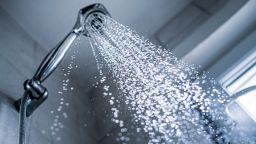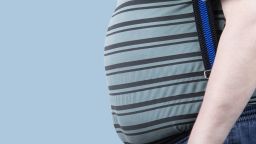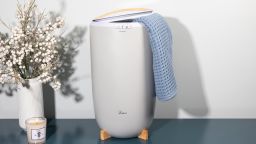Get inspired by a weekly roundup on living well, made simple. Sign up for CNN’s Life, But Better newsletter for information and tools designed to improve your well-being.
从每周的综述中获得灵感,让生活变得简单。 订阅 CNN 的 Life, But Better 时事通讯,获取旨在改善您幸福感的信息和工具。
You may have seen people jumping into frigid seas or stylish ice baths, claiming these dunks are good for heart health, muscle recovery, stress and more.
您可能已经看到人们跳入寒冷的海洋或时尚的冰浴中,声称这些扣篮有益于心脏健康、肌肉恢复、压力等。
This practice is known as cold water immersion, a type of cryotherapy or cold therapy — which can be applied for medical or therapeutic purposes in various ways. It can be done via ice, water or air, including cryosurgery for lesions, ice packs for swelling, or through ice baths for various purposes including exercise recovery or stress reduction.
这种做法被称为冷水浸泡,这是一种冷冻疗法或冷疗法——可以以各种方式应用于医疗或治疗目的。它可以通过冰、水或空气来完成,包括用于病变的冷冻手术、用于肿胀的冰袋,或通过冰浴用于各种目的,包括运动恢复或减压。
There is a long history of people immersing themselves in cold water for the purported health benefits, tracing all the way back to ancient Greece — and thus a larger body of research on this type of cold therapy. In modern times, some people wonder if cold showers, a more accessible form of this trend, could also do the trick.
人们为了所谓的健康益处而将自己浸泡在冷水中的历史由来已久,这可以追溯到古希腊——因此对这种冷疗的研究范围更广。在现代,有些人想知道冷水淋浴(这种趋势的一种更容易获得的形式)是否也可以解决问题。

“The research is very, very thin as it pertains to cold showers itself,” said Dr. Corey Simon, an associate professor in the department of orthopedic surgery at Duke University and senior fellow at the Duke Aging Center. There are at least 100 studies, some of which are decades old or have methodological issues, and most also have low numbers of participants, who are usually healthy younger adults, Simon said.
“这项研究非常非常薄弱,因为它与冷水淋浴本身有关,”杜克大学骨科外科副教授、杜克大学老龄化中心高级研究员科里·西蒙博士说。 Simon说,至少有100项研究,其中一些已经有几十年的历史或存在方法学问题,而且大多数受试者的人数也很少,他们通常是健康的年轻人。
But experts have ideas for why cold showers might work, based on what scientific and anecdotal evidence there is, he added.
但他补充说,根据现有的科学和轶事证据,专家们对为什么冷水淋浴可能有效有想法。
Mental and heart health 心理和心脏健康
Simon thinks most of the benefits of cold showers come from the psychological process of adapting to and overcoming a stressor — in this case, the chilly water.
西蒙认为,冷水淋浴的大部分好处来自适应和克服压力源的心理过程——在这种情况下,是冷水。
“Folks don’t just go from zero to 60 in cold showers,” he said. “They have to work up to them usually, so there is the element of your body being able to control being in a stressful environment.”
“人们不会在洗冷水澡时从零到60,”他说。“他们通常必须达到他们的能力,所以你的身体能够控制在压力环境中的元素。”
This theory tracks with the results of some studies on cold showers. Participants who took showers with a water temperature of about 50 degrees Fahrenheit to 57.2 degrees Fahrenheit (10 degrees Celsius to 14 degrees Celsius) — for up to a minute daily for two weeks — reported lower stress levels than the control group, according to an October 2022 study published in the journal Current Psychology. The benefits were stronger when participants took their showers after doing a few rounds of a breathing technique that involved deep breathing, exhalation and breath holding.
这一理论与一些关于冷水淋浴的研究结果相吻合。根据 2022 年 10 月发表在《当代心理学》杂志上的一项研究,在水温约为 50 华氏度至 57.2 华氏度(10 摄氏度至 14 摄氏度)的情况下淋浴的参与者——连续两周每天最多一分钟——报告的压力水平低于对照组。当参与者在做了几轮包括深呼吸、呼气和屏气的呼吸技巧后洗澡时,好处更大。
Simon takes a cold shower once or twice per week, which he said has helped him become more mentally present in general since the practice forces him to process the “suffering.”
西蒙每周洗一到两次冷水澡,他说这帮助他在总体上变得更加精神活跃,因为这种做法迫使他处理“痛苦”。
Cold showers may also improve mood and energy or mental alertness, which Dr. Rachelle Reed, an exercise physiologist in Athens, Georgia, has experienced, she said. “You sort of feel a little bit elated, and that is thought to be due at least in part to that increase in (the) neurotransmitters epinephrine, norepinephrine and dopamine.”
她说,冷水淋浴还可以改善情绪和能量或精神警觉性,佐治亚州雅典的运动生理学家雷切尔·里德(Rachelle Reed)博士已经经历过这种情况。“你会感到有点兴高采烈,这被认为至少部分是由于神经递质肾上腺素、去甲肾上腺素和多巴胺的增加。
These psychological benefits may also be a primary reason why some people feel cold showers reduce their pain, for which psychological distress is a main predictor, Simon said.
西蒙说,这些心理上的好处也可能是一些人觉得冷水淋浴可以减轻疼痛的主要原因,心理困扰是一个主要预测因素。
During immersive cold therapy, the temperature shock can briefly stress the cardiovascular system, spiking blood pressure, heart rate and breathing rate, experts said. But this hyperactivity can lead to improved blood flow since the body needs to work to return to its normal state and warm up, Reed said. Cold showers could theoretically produce the same effect to some extent.
专家说,在沉浸式冷疗期间,温度冲击会短暂地给心血管系统带来压力,使血压、心率和呼吸频率飙升。但是,这种多动症可以改善血液流动,因为身体需要工作才能恢复到正常状态并热身,里德说。从理论上讲,冷水淋浴可以在一定程度上产生同样的效果。
That said, people who have cardiovascular issues, circulatory problems, sensation issues — such as Raynaud’s disease or neuropathy — or diabetes should not try cold showers without speaking to a doctor first, experts said. The same goes for those who are pregnant, have recently had surgery, or are under the influence of alcohol or drugs, Reed said.
也就是说,专家说,有心血管问题,循环系统问题,感觉问题(如雷诺氏病或神经病变)或糖尿病的人不应该在没有先与医生交谈的情况下尝试冷水淋浴。里德说,那些怀孕、最近做过手术或受到酒精或药物影响的人也是如此。
People have died from trying cold therapy, Simon said, so this disclaimer is serious and should not be ignored.
西蒙说,人们因尝试冷疗而死亡,因此这种免责声明很严重,不应被忽视。
Supporting immunity 支持免疫力
Cold showers may also help support the immune system. In a May 2014 study, the authors tested whether the immune systems of a small group of Dutch men could be improved by practicing meditation, deep breathing and cold showers for 10 days. When the authors administered a bacterial infection via injection, the study participants who had used the wellness techniques had fewer symptoms. Those participants also produced more anti-inflammatory chemicals and less inflammatory proteins in response to the infection.
冷水淋浴也可能有助于支持免疫系统。在 2014 年 5 月的一项研究中,作者测试了一小群荷兰男性的免疫系统是否可以通过练习冥想、深呼吸和冷水淋浴 10 天来改善。当作者通过注射进行细菌感染时,使用健康技术的研究参与者的症状较少。这些参与者还产生了更多的抗炎化学物质和较少的炎症蛋白作为对感染的反应。
But Simon isn’t sure this result is wholly positive, since recent research has started to suggest decreasing the inflammatory response to temporary illness might prolong or prevent recovery, he said. Chronic inflammation, not acute inflammation, is the bigger problem, Simon said. The Dutch study also doesn’t reflect the individual effectiveness of the three techniques: meditation, deep breathing and cold showers.
但西蒙不确定这个结果是否完全是积极的,因为最近的研究已经开始表明,减少对暂时疾病的炎症反应可能会延长或阻止康复,他说。慢性炎症,而不是急性炎症,是更大的问题,西蒙说。荷兰的研究也没有反映出这三种技术的个体有效性:冥想、深呼吸和冷水淋浴。
However, a September 2016 study based in the Netherlands found people who spent 30 to 90 seconds taking a cold shower experienced a 29% reduction in the amount of time absent from work due to sickness. There have also been anecdotal reports of getting sick less often while taking cold showers.
然而,2016 年 9 月在荷兰进行的一项研究发现,花 30 到 90 秒洗冷水澡的人因病缺勤的时间减少了 29%。也有轶事报道称,洗冷水澡时生病的次数较少。
Cold showers could be beneficial in regard to fitness as a way to alleviate muscle soreness — but not right after a resistance training workout, Reed said.
里德说,冷水淋浴可能有助于缓解肌肉酸痛,但不能在阻力训练锻炼后立即进行。
“The latest evidence suggests that you would not want to disrupt the inflammation process that comes after lifting,” Reed said, which causes “the muscles to get stronger and larger and more efficient over time.”
“最新的证据表明,你不想破坏举重后的炎症过程,”里德说,这会导致“肌肉随着时间的推移变得更强壮、更大、更有效率”。
Reed recommended using cold therapy only on days off from lifting. Additionally, cold showers may temporarily increase metabolism but haven’t been linked to weight loss.
里德建议只在举重后的休息日使用冷疗。此外,冷水淋浴可能会暂时增加新陈代谢,但与减肥无关。
Taking a cold shower 洗个冷水澡
If you want to try taking cold showers and have been cleared by your doctor, start small, experts said.
专家说,如果你想尝试洗冷水澡,并且已经得到医生的许可,那就从小事做起。
Studies tend to employ cold showers in the range of 50 degrees Fahrenheit to 60 degrees Fahrenheit (10 degrees Celsius to 15.5 degrees Celsius), but a thermometer isn’t required, said Simon, who doesn’t use a thermometer and still experiences benefits — though he acknowledges this is anecdotal.
研究倾向于在50华氏度至60华氏度(10摄氏度至15.5摄氏度)的范围内使用冷水淋浴,但不需要温度计,西蒙说,他不使用温度计,但仍然有好处 - 尽管他承认这是轶事。
Quickly going from hot to cold could be too shocking, so ease from lukewarm water into cold, Simon suggested.
西蒙建议说,快速从热到冷可能太令人震惊了,所以从温水到冷水很容易。
Fifteen to 30 seconds of cold exposure is good to begin with, Reed said. After that, try adding 15 seconds or so every few weeks.
里德说,15到30秒的冷暴露是很好的开始。之后,尝试每隔几周增加 15 秒左右。
As you build your tolerance level, box breathing can help you feel calm in the shower; resist holding your breath for too long, she added. That involves inhaling for four counts, holding for four counts, exhaling for four counts and holding for four counts.
随着您建立耐受水平,箱式呼吸可以帮助您在淋浴时感到平静;她补充说,不要屏住呼吸太久。这包括吸气四次,保持四次,呼气四次,屏住四次。
Pay attention to your body’s feedback and any cues that you should remove yourself from the cold, Reed said.
注意你身体的反馈和任何你应该让自己远离寒冷的线索,里德说。
Simon and Reed can’t definitively say taking cold showers are a surefire way to improve overall health, but they do think that in a stressful world, the practice can be a good addition to a baseline level of health already supported by the basics: diet, hydration, physical activity and sleep.
西蒙和里德不能明确地说洗冷水澡是改善整体健康的可靠方法,但他们确实认为,在一个压力很大的世界里,这种做法可以很好地补充已经得到基本基本条件支持的基线健康水平:饮食、补水、身体活动和睡眠。












